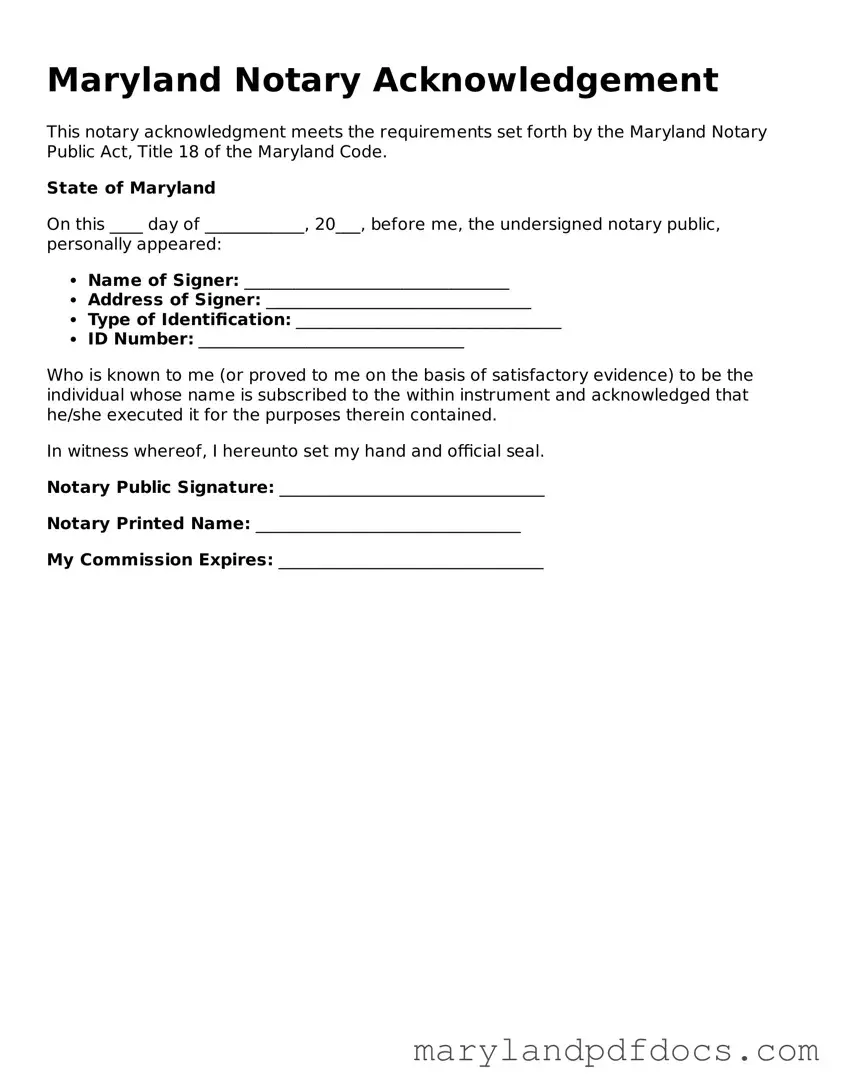What is a Maryland Notary Acknowledgement form?
The Maryland Notary Acknowledgement form is a legal document that verifies the identity of a signer and confirms that they willingly signed a document. It is often used in conjunction with deeds, contracts, and other legal instruments to provide assurance that the signature is authentic and that the signer understands the contents of the document.
Who can serve as a notary in Maryland?
In Maryland, a notary public must be at least 18 years old, a resident of the state, or employed in Maryland. They must also complete a notary training course and pass an examination. After meeting these requirements, an individual can apply for a notary commission through the Maryland Secretary of State.
What information is typically included in the Notary Acknowledgement form?
A Maryland Notary Acknowledgement form generally includes the name of the signer, the date of the acknowledgment, the notary's name, and their signature. It may also contain the notary's seal and a statement affirming that the signer appeared before the notary and acknowledged their signature on the document.
Is a Notary Acknowledgement form required for all documents?
No, a Notary Acknowledgement form is not required for all documents. However, many legal documents, especially those involving property transfers or significant agreements, often require notarization to ensure their validity and to provide a layer of protection against fraud.
How does one complete a Notary Acknowledgement form?
To complete a Notary Acknowledgement form, the signer must appear before the notary public. The notary will verify the identity of the signer, typically by checking a government-issued ID. After confirming the identity and willingness of the signer, the notary will complete the form, including their signature and seal.
Can a Notary Acknowledgement be done remotely in Maryland?
As of October 2023, Maryland allows remote notarization under certain conditions. Notaries must use approved technology to conduct the notarization and comply with specific state guidelines. It is important to ensure that all requirements for remote notarization are met to maintain the validity of the document.
What is the difference between a Notary Acknowledgement and a Notary Jurat?
A Notary Acknowledgement confirms that a signer has acknowledged their signature on a document, while a Notary Jurat involves the signer taking an oath or affirmation regarding the truthfulness of the contents of the document. Both serve different purposes and are used in different contexts within legal documentation.
How long is a Notary Acknowledgement valid in Maryland?
A Notary Acknowledgement does not have a specific expiration date. However, the validity of the document itself may depend on the type of document being notarized. It is advisable to check the requirements for the specific document to determine if any additional actions are necessary after a certain period.
What should I do if my Notary Acknowledgement is challenged?
If a Notary Acknowledgement is challenged, it is essential to gather all relevant documentation and evidence supporting the notarization. Consulting with a legal professional may provide guidance on how to address the challenge effectively. Maintaining accurate records and following proper procedures during the notarization process can help mitigate potential issues.

